|
|
|
Sort Order |
|
|
|
Items / Page
|
|
|
|
|
|
|
| Srl | Item |
| 1 |
ID:
108895
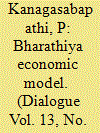

|
|
|
| 2 |
ID:
119940
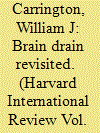

|
|
|
| 3 |
ID:
134046
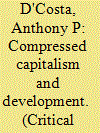

|
|
|
|
|
| Publication |
2014.
|
| Summary/Abstract |
The global capitalist system is at a particular historical juncture with a dilution of the capitalist core away from Western (and Japanese) centers of accumulation to China and India, among other countries. What is the nature of capitalism in these countries? Are China and India going along the same development trajectories that advanced capitalist countries followed earlier? Is their accumulation model the same as that of the OECD economies or is accumulation different under late capitalism? The author argues that capitalism in India and China is "compressed," meaning that the phases of capitalism do not follow one another in sequential order. Instead, some phases, such as primitive accumulation, may be delayed or be experienced at the same time as advanced accumulation under the corporate sector, thereby producing a mode of development that does not generate widespread employment. The author contends that capitalism in India and China is compressed and he demonstrates empirically that primitive accumulation, petty commodity producing sectors, and mature capitalism in late-industrializing countries reinforce each other, creating precarious forms of employment in the process.
|
|
|
|
|
|
|
|
|
|
|
|
|
|
|
|
| 4 |
ID:
132682
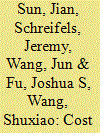

|
|
|
|
|
| Publication |
2014.
|
| Summary/Abstract |
Coal-fired power plants in China have emitted multiple pollutants including sulfur dioxide, nitrogen oxides and fine particulates, contributing to serious environmental impairments and human health issues. To meet ambient air quality standards, the installation of effective pollution control technologies are required and consequently, the cost of installing or retrofitting control technologies is an important economic and political concern. A multi-pollutant control cost model, CoST CE, is developed to calculate the cost of multi-pollutant control strategies in the Yangtze River Delta region (YRD) of China, adopting an LP algorithm to optimize the sorting of control technology costs and quickly obtain a solution. The output shows that total costs will increase along with emission abatement. Meanwhile, the slope becomes steeper as greater emission reductions are pursued, due to the need to install highly effective, but expensive, technologies like SCR and FF. Moreover, it is evident that the cost curve shapes, maximum abatement potential and total cost for the three provinces in the YRD region are quite different due to differences in power plant type and technologies, current emission levels and existing pollution controls. The results from this study can aid policy makers to develop cost-effective control strategies for the power sector.
|
|
|
|
|
|
|
|
|
|
|
|
|
|
|
|
| 5 |
ID:
096677
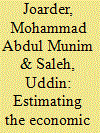

|
|
|
|
|
| Publication |
2010.
|
| Summary/Abstract |
Following Friedman et al. (2000), we have developed an economic model of Hundi (an informal money transfer system) behavior and is designated to identify the factors that determine the channels (formal or informal) used by remitters. The model is empirically tested using Tobit analysis for a sample of 132 returned migrants of greater Sylhet region in Bangladesh with work experience in 11 different host countries. Our findings suggest that sending remittances through Hundi first increases with age, peaks at one point, and then declines thereafter. It is observed that single or unmarried migrants are more likely to remit through Hundi, while relatively educated migrants have the opposite preferences. Cost and financing of migration have significant impact on an individual's decision to choose the remitting channel. It is also found that the nature of the migration and type of job abroad affect an individual's decision to use the remitting channel. Furthermore, migrants who have no ability to speak the language of the country of destination are generally more inclined to remit through an informal channel. Finally, migrants who receive low commission to remit, have families or relatives living in remote areas and mainly dependent on remittances, and have the opportunity to remit in holidays are more likely to remit through Hundi than their counterparts.
The draft version of this paper was presented at a seminar on Annual Asian Business Research Conference organized by World Business Institute, Victoria, Australia in BIAM Foundation, Dhaka, Bangladesh during 1-2 January, 2010.
|
|
|
|
|
|
|
|
|
|
|
|
|
|
|
|
| 6 |
ID:
108474
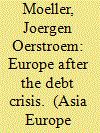

|
|
|
|
|
| Publication |
2011.
|
| Summary/Abstract |
The Euro zone was caught unprepared by the financial crisis originating in the USA followed by the recession. Severe flaws in the designs hidden by the "good" years surfaced calling for action. After a good deal of fumbling, the Euro zone moves towards a fiscal union anchored in acceptance of a "German" economic model-low inflation, low deficits, and debts. The Euro will survive with two major changes. The integration will be stronger and the core countries in the Euro zone will exercise stronger leadership raising awkward policy decision for the skeptical members of the EU, but outside the Euro.
|
|
|
|
|
|
|
|
|
|
|
|
|
|
|
|
| 7 |
ID:
131892
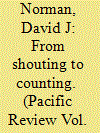

|
|
|
|
|
| Publication |
2014.
|
| Summary/Abstract |
This article explores the emergence of new spaces for civil society organisations (CSOs) as a result of an increasing interest by international donors in multi-stakeholder approaches to good governance under the 'new policy agenda'. Drawing upon a contemporary case study of civil society in Cambodia, it argues that CSOs have been encouraged to perform two key roles on a national level: professional service delivery agents and democratic watchdogs. Both roles are seen by donors as integral to supporting an accountable and professional model of the Cambodian state while drawing upon valuable private sector lessons in a synergetic model of governance. The result is the construction of particular neoliberal spaces for CSOs operating as technical implementation mechanisms in response to externally driven donor pressures. Furthermore, under this new framework of governance, CSOs face pressure to undergo internal transformation akin to new public management reform; embracing economistic and administrative modes of coordination as core values of civil society participation.
|
|
|
|
|
|
|
|
|
|
|
|
|
|
|
|
| 8 |
ID:
131764
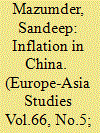

|
|
|
|
|
| Publication |
2014.
|
| Summary/Abstract |
Among the few papers that have examined the determinants of inflation dynamics in mainland China, the majority of those that have investigated this matter argue that the traditional Phillips curve does not fit China's data. Some authors, however, conclude that the New Keynesian Phillips Curve does a better job of describing Chinese inflation behaviour in recent decades. This paper conducts an analysis of China's inflation behaviour from the late 1980s onwards by estimating both traditional and new Phillips curves using improved econometric techniques. We find that the New Keynesian Phillips Curve performs poorly in explaining China's inflation behaviour, whereas the traditional 'old' Phillips curve does significantly better.
|
|
|
|
|
|
|
|
|
|
|
|
|
|
|
|
| 9 |
ID:
130995
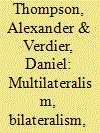

|
|
|
|
|
| Publication |
2014.
|
| Summary/Abstract |
Different international regimes are built from legal instruments that vary in terms of whether they are multilateral, bilateral, or a combination thereof. We investigate the reasons for such variation. The choice between multilateralism and bilateralism is a function of the tradeoff between each instrument's relative flaw. Multilateralism is wasteful in incentives, as the same agreement is offered to all states regardless of their compliance costs. Bilateralism mitigates this problem by allowing for more tailored agreements but in the process multiplies transaction costs by requiring many of them. We use a formal model to generate propositions on the design of "lateralism" and the related issue of membership size and offer illustrations in the context of four regimes: foreign direct investment, human rights, climate change, and international trade.
|
|
|
|
|
|
|
|
|
|
|
|
|
|
|
|
| 10 |
ID:
095214
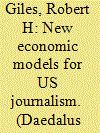

|
|
|
| 11 |
ID:
184979
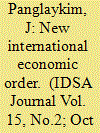

|
|
|
| 12 |
ID:
146377
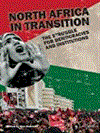

|
|
|
|
|
| Publication |
London, International Institute for Strategic Studies, 2015.
|
| Description |
155p.pbk
|
| Series |
Adelphi Series; 452
|
| Standard Number |
9781138653351
|
|
|
|
|
|
|
|
|
|
|
|
Copies: C:1/I:0,R:0,Q:0
Circulation
| Accession# | Call# | Current Location | Status | Policy | Location |
| 058754 | 320.961/FIS 058754 | Main | On Shelf | General | |
|
|
|
|
| 13 |
ID:
127198
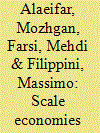

|
|
|
|
|
| Publication |
2014.
|
| Summary/Abstract |
This paper studies the cost structure of Swiss gas distribution utilities. Several econometric models are applied to a panel of 26 companies over 1996-2000. Our main objective is to estimate the optimal size and scale economies of the industry and to study their possible variation with respect to network characteristics. The results indicate the presence of unexploited scale economies. However, very large companies in the sample and companies with a disproportionate mixture of output and density present an exception. Furthermore, the estimated optimal size for majority of companies in the sample has shown a value far greater than the actual size, suggesting remarkable efficiency gains by reorganization of the industry. The results also highlight the effect of customer density on optimal size. Networks with higher density or greater complexity have a lower optimal size
|
|
|
|
|
|
|
|
|
|
|
|
|
|
|
|
| 14 |
ID:
154506
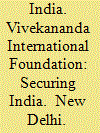

|
|
|
|
|
| Publication |
New Delhi, Wisdom Tree, 2017.
|
| Description |
vi, 202p.hbk
|
| Standard Number |
9788183284950
|
|
|
|
|
|
|
|
|
|
|
|
Copies: C:1/I:0,R:0,Q:0
Circulation
| Accession# | Call# | Current Location | Status | Policy | Location |
| 059137 | 355.033054/IND 059137 | Main | On Shelf | General | |
|
|
|
|
| 15 |
ID:
108512
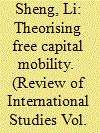

|
|
|
|
|
| Publication |
2011.
|
| Summary/Abstract |
Using a simple economic model, this article illustrates the greatly diverging interests and preferences of developed and developing countries with regards to capital mobility. Theoretically, developed countries' gain from free capital mobility likely comes at the expense of risk and loss for developing countries due to the latter's financial vulnerability. It is also found that it does not pay for a developed country to push its developing counterparts into prematurely liberalising their capital markets because this type of impatience reduces the developed country's own first-mover advantage in strategic bargaining for capital mobility benefits.
|
|
|
|
|
|
|
|
|
|
|
|
|
|
|
|
| 16 |
ID:
130190
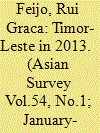

|
|
|
|
|
| Publication |
2014.
|
| Summary/Abstract |
In early 2013, Timor-Leste started to walk solely on its own feet, after the departure of the United Nations Integrated Mission in Timor-Leste and the International Stabilization Force. The year has proved to be broadly peaceful, signifying that the country has learned to live within its own resources. The level of political consensus has increased, as Timor-Leste engages in a process of generational turnover.
|
|
|
|
|
|
|
|
|
|
|
|
|
|
|
|
| 17 |
ID:
131125
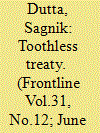

|
|
|
|
|
| Publication |
2014.
|
| Summary/Abstract |
A new OECD declaration paves the way for access to information on bank accounts in tax havens like Switzerland, but is still skewed in favour of such tax havens.
|
|
|
|
|
|
|
|
|
|
|
|
|
|
|
|
| 18 |
ID:
118264
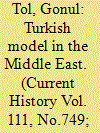

|
|
|
|
|
| Publication |
2012.
|
| Summary/Abstract |
The success of Turkey's democratic experiment and its economic model of high-productivity and export-led growth have contributed to the country's rising image in a region where authoritarian regimes and rentier economies dominate.
|
|
|
|
|
|
|
|
|
|
|
|
|
|
|
|
| 19 |
ID:
134156


|
|
|
|
|
| Publication |
2014.
|
| Summary/Abstract |
Although research on violent extremism traditionally focuses on why individuals become involved in terrorism, recent efforts have started to tackle the question of why individuals leave terrorist groups. Research on terrorist disengagement, however, remains conceptually and theoretically underdeveloped. In an effort to enhance our understanding of disengagement from terrorism and pave the way for future empirical work, this article provides a multidisciplinary review of related research from psychology, sociology, and criminology. Significant promise for moving beyond the existing push/pull framework is found in Rusbult and colleagues' investment model from psychology and Ebaugh's research on voluntary role exit from sociology. Rusbult's investment model offers insight into when and why individuals disengage from terrorism, while accounting for individual, group, and macro-level differences in the satisfaction one derives from involvement, the investments incurred, and the alternatives available. Ebaugh's research on voluntary role exit provides a deeper understanding of how people leave, including the emotions and cuing behavior likely to be involved. The article highlights the strengths and limitations of these frameworks in explaining exit and exit processes across a variety of social roles, including potentially the terrorist role, and lends additional insights into terrorist disengagement through a review of related research on desistance from crime, disaffiliation from new religious movements, and turnover in traditional work organizations.
|
|
|
|
|
|
|
|
|
|
|
|
|
|
|
|
| 20 |
ID:
174513
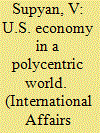

|
|
|
|
|
| Summary/Abstract |
THE U.S., as a leader in innovation, is among the top-ranked countries in the world, according to key indicators for both economic development and global economic relations. For years, even decades, there was no doubt about the economic and geopolitical leadership of the U.S. However, in spite of remaining a leader in key economic areas, the U.S. is no longer so indisputably dominant in all respects, as the 21st century world is becoming increasingly polycentric.
|
|
|
|
|
|
|
|
|
|
|
|
|
|
|
|
|
|
|
|
|